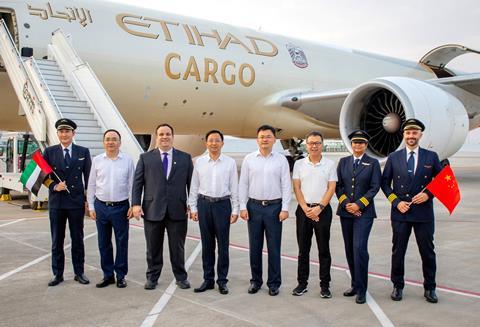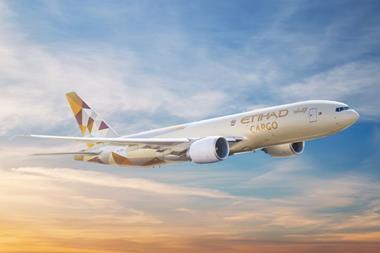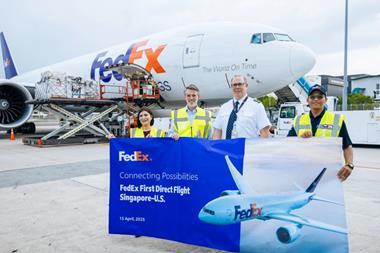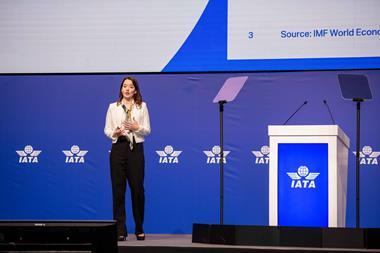Etihad Cargo has been ramping up its focus on the China market over recent months.
In the last few weeks, the carrier has added new weekly Boeing 777 freighter services to the recently opened cargo specialist Ezhou Airport in China’s Hubei province and a new service to Guangzhou.
In total, the carrier now operates 10 freighter flights a week to mainland China.
In addition to the freighter flights to Ezhou and Guangzhou, the carrier also offers eight weekly freighter flights to Shanghai.
Etihad Cargo head of revenue management, fleet and network Leonard Rodrigues tells Air Cargo News that its cargo capacity to the country has increased 25% compared with pre-Covid levels.
He adds that there could be a further four weekly flights added in the future in response to customer demand, although there is “just a question of the when and the how and which customers”.
Meanwhile, Etihad also offers ten passenger flights per week to Beijing, Guangzhou and Shanghai, as well as road feeder services to 25 domestic mainland China destinations.
Rodrigues says the carrier is still rebuilding its passenger network to China as it continues to adjust following the lifting of Covid restrictions.
He adds that Etihad Cargo’s China traffic tends to have a higher share of its overall volumes compared with other Middle Eastern carriers.
“China is a strategic focus that is on the passenger side and on the cargo side. China is at the top of our list when it comes to tourism priorities and trade priorities and this is even at the level of our shareholder [sovereign-wealth fund] ADQ,” Rodrigues says.
The addition of extra flights comes as China’s manufacturing output is recovering more slowly than many had expected following the lifting of Covid restrictions.
The South China Morning Post reported that industrial output from China’s hi-tech manufacturing sector grew by just 0.7% year on year in July, the slowest pace since records began in September 2018.
The publication says that a tech war between the US and China, deflation fears, weak demand and weak sentiment were contributory factors to low growth.
However, Rodrigues is confident that the airline has not overcommitted to the country.
“We don't see a different market to what everybody else sees,” he says. “Yet, we have got a few key advantages.
“The first thing is that there is a strong tie between China and the UAE so I think naturally there are already a lot of shipments from China to the UAE on a point to point.
"That means operations are relatively easy to plan because you have a freighter and a big share of it is just for the UAE itself. So the link between the countries is a key advantage."
He adds that the carrier also has a “superstar team” in the country with customers often praising them.
Finally, he points out that the carrier has a smaller freighter fleet – five Boeing 777s – than many of its rivals, making it easier to fill its freighters with the traffic generated by its bellyhold operations and match supply and demand.

Most recently, the carrier added the service to Ezhou in partnership with express carrier SF Airlines.
Rodrigues explains that the partnership is based on a block space agreement with the Chinese carrier, which sees SF operate a weekly freighter service between Abu Dhabi and Ezhou.
The most obvious advantage to the new partnership is the extra frequency the two airlines will be able to offer to customers.
But there are also wider benefits by expanding SF Airlines’ reach and providing extra volumes for Etihad’s flights, says Rodrigues.
“They are strong with their pan-Asian network and now they want to offer to those customers the capabilities to reach the rest of the world and we are extremely good in our feeds for the rest of the world,” he explains.
Rodrigues adds that both carriers have focused on growing their respective local communities.
“For them, it is the Hubei province and for us, it is Abu Dhabi,” he says. “We both want to expand our logistics hubs, focus on pharmaceuticals, focus on e-commerce and then - the bigger picture - with logistics you also help grow the economy.
“This is a shared vision that we have through ADQ and they have through their group and the Hubei province.”
Ezhou Airport itself was only recently opened with the first flight taking place just over a year ago.
Rodrigues says he has been impressed with the airport.
“The airport itself is really amazing,” he says. “There are not so many of those airports that are really made for cargo - it is the only one that exists in Asia.
“It is centred around a major warehouse and everything there helps with logistics.”
He highlights the technology the airport is able to offer – such as cargo dimensioning to improve aircraft utilisation – multimodal connections and a seamless customs process.
“From a facilities perspective, you have everything you want,” he says.
“It is also connected by a bonded mechanism to a port on the Yangtze River, there is also an expressway and a bullet train terminal that goes directly out of the warehouse. You've got the road, the air, the rail and the sea. Everything in one.”
Looking ahead, the airport is aiming to achieve CEIV Pharma and CEIV Fresh certification to encourage the import of products through the airport.
“Around 20% of the cargo that goes to China tends to be pharmaceuticals because they import a lot from Europe,” says Rodrigues.
“This certification will be really the first step for them to demonstrate their capabilities, that there is not going to be any break in the cold chain for distribution.”
Looking ahead to the coming peak season, Rodrigues predicts an improvement on last year but adds that demand is under control.
“The amount of demand adds up to the level of supply so overall there is no cause for a major peak.
“But what tends to happen that acts as a bit of a disruptor is the e-commerce demand.
“All the e-commerce players have demand for committed capacity.”
He adds that charter prices for the fourth quarter are already up by around 20-25% compared with the third quarter – last year there was no increase in charter prices between the two periods.
“There will be some level of peak because some people will need 100-tonne capacity and the charter prices are already increasing.
“Whether it will extend to an overall ad hoc market that fights against each other for the last pallet capacity on every flight, it doesn't seem like it at the moment.”
https://www.aircargonews.net/airlines/etihad-cargo-adds-ezhou-huahu-airport-to-its-network/














